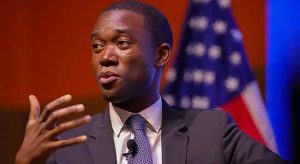
New York — U.S. Deputy Treasury Secretary Wally Adeyemo on Thursday said he hoped Congress would extend a trade program that grants exports from qualifying African countries duty-free access to the U.S. market, hailing the strategic opportunities in the region.
Adeyemo told the Reuters NEXT conference that the two-decade-old African Growth and Opportunity Act (AGOA), which is due to expire in 2025, had played an important in Africa and should be extended.
“My hope is that Congress will act to make sure that we continue to have tools that allow us to deepen our trade with Africa,” he said.
“It matters to us. We need to seize the huge opportunity that it is for us to engage with Africa, a continent with a burgeoning young population that is central to many of our economic, but national security interests as well.”
Adeyemo did not comment specifically on legislation proposed by Democratic Senator Chris Coons that would extend the program for 16 years to 2041.
African countries are pressing for at least a 10-year renewal of the pact ahead of the 2024 U.S. election. President Joe Biden’s administration is also seeking the program’s reauthorization but has called for certain reforms.
More than $10 billion worth of African exports entered the United States duty-free under the program in 2022. The pact has bipartisan support in Washington, but there are divisions on how to update it.
Adeyemo, who was born in Nigeria and grew up in California, said he met with U.S. companies that have investments or operations in Nigeria during a visit there in September, and they were pressing for reforms before amping up their stakes.
“They want to do more business in Nigeria but in order to do so, Nigeria has to make the type of economic reforms that make it easier for foreign direct investment to come in and for money to get out,” said Adeyemo, the highest-ranking member of the African diaspora in the Biden administration.
His visit to Africa followed those of other top officials, including Treasury Secretary Janet Yellen and Vice President Kamala Harris.
He said Nigeria’s population was slated to grow from 200 million today to 450 million by 2050, creating both challenges and opportunities, and U.S. firms could contribute to that.
*Andrea Shalal; editing: Michael Perry – Reuters


